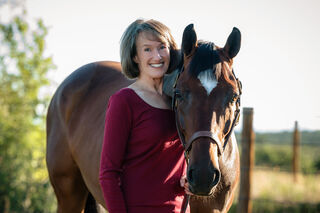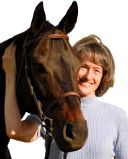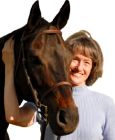Attachment
Is Equine Attachment Real?
Just how closely do horses attach to their humans?
Posted November 2, 2022 Reviewed by Vanessa Lancaster

I’ve been traveling a lot for the past couple of months, so my horse True North has had a few vacations at home. He lives with 15 other horses, who are all turned into big pastures daily. Normally, when I walk to True’s turnout to fetch him for a training session, he sees me coming and whinnies. (You can’t sneak anything past a horse.) Then he waits as I approach—it’s about a five-minute walk to get to his gate.
Upon returning from a two-week presentation stint in Poland and the Czech Republic, my first priority was to go see True. It was the longest we had ever been apart. Friends and barn staff said he “moped” during my absence and seemed “bored.” We don’t know for sure whether horses have these emotions, but it’s possible. Their brains are not built in a way that allows them to experience such feelings in the same way humans do. But that doesn’t mean the emotions don’t exist.
On that first day home, True caught sight of me at the usual spot along my walk toward his turnout. He whinnied. Nothing unusual there; he does that almost every time. But this time, he continued whinnying nonstop for the next three or four minutes while I approached. In three years of near-daily visits, he had never done that before. For much of this distance, trees block his view. But he knew I was coming and gave me a greeting. He didn’t stop whinnying until my hands were on his neck. It felt great.
"It felt great"? Why, because he loved me? Missed me? That sounds hopelessly anthropomorphic. We scientists are trained never to attribute human characteristics to an animal. True displayed behavior that looked as if he was attached to me. But was that really equine attachment? Or was it just my human anthropomorphism? It seems to me that either option is possible, or both.
OK, I’ll admit it: When I’m gone, I miss True–just as I would miss my dogs, cats, or two-legged loved ones. But we already know that human attachment is strong and can transfer to other animals, objects, ideas, and invisible gods. What we don't know is whether it works in the opposite direction: Do horses become emotionally attached to humans?
Horses, riders, and trainers form deep psychological bonds of trust over time, much to the surprise of those who are not horse-savvy. Maybe 1200-pound prey animals just don’t seem cuddly enough for attachment, but they are. Remember Harry Harlow’s 1958 research showing that infant monkeys would pass up food to cling instead to a cloth-covered wire cage for attachment? Nothing too cuddly about that.
The brain-based horsemanship I’ve developed advocates daily training in bonding and attachment. It leads to greater safety and effectiveness in training young horses—who often behave like hysterical beasts. One test of equine-human attachment occurs when we turn a horse loose in an arena where some frightening natural event might occur. Horses are very skittish, so a “frightening event” can be something as benign as the sudden movement of a bird.
When such an event occurs, does the horse run to the farthest point in the arena? Or does he run to his human, positioned in the center of the arena (and therefore much closer to the scary stimulus)? When he does the latter, I believe he is displaying attachment. He demonstrates that he wants human comfort and reassurance more than he wants to get away from something that scares him. This little test is easy to perform, and it can be done with multiple humans to determine which one the horse prefers to approach.
Horses are already used as excellent research models for human depression and anxiety. In general, their daily behavior is driven by the emotion of fear. They exhibit jealousy and sadness. They play—both with other horses and with their humans.
Could prey animals be capable of “missing” their human, of “moping” when he or she is gone, of becoming “bored” with lack of activity? Did a lack of exercise cause True’s moping behavior? Maybe, but he was turned out to run and play every day. Did his whinnying behavior mean that he missed me? I don't know.
In the future, we will develop a better understanding of animal emotions. Frans de Waal–a scientist of animal emotion–has argued that anthropomorphism is outdated and is being pushed out by new evidence from predator animals like apes. Like De Waal, I’m trained as a scientist, so my answer to these questions with respect to prey animals is that we will have to conduct empirical research to find out.
Some of that research might soon be underway. I’m working with colleagues at Colorado State University’s Veterinary School to develop equine brain studies. Some of them might help to answer these questions. I hope so.
In the meantime, I love my horse, and I’m going to continue to enjoy his post-European greetings. Anthropomorphic or not.
References
Harlow, H. F. (1958). The nature of love. American Psychologist, 13, 673-685.
De Waal, F. (2019). Mama's Last Hug. New York: Norton & Company.




